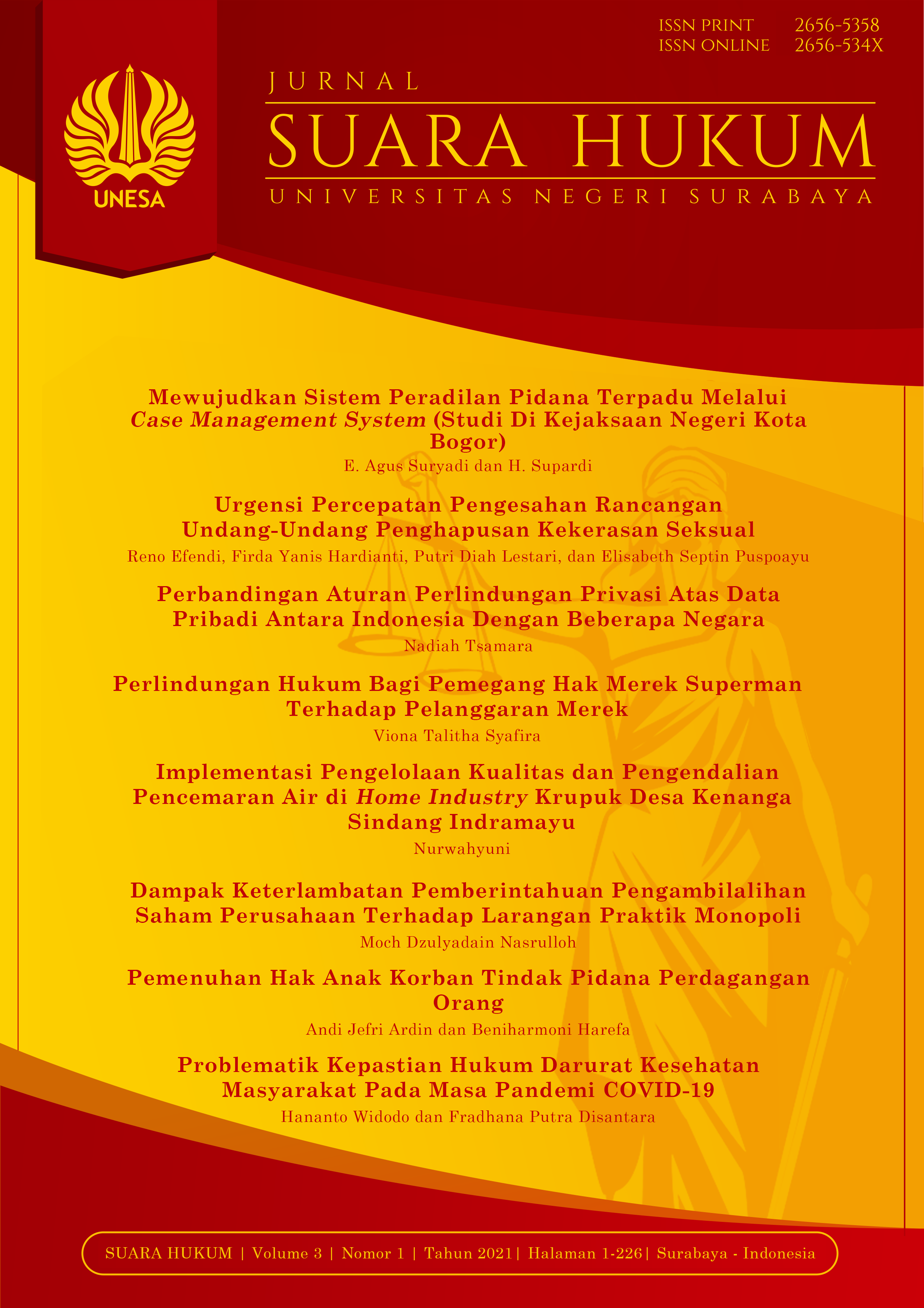Problematik Kepastian Hukum Darurat Kesehatan Masyarakat Pada Masa Pandemi COVID-19
DOI:
https://doi.org/10.26740/jsh.v3n1.p197-226Keywords:
State of Emergency Law, Public Health Emergency, COVID-19Abstract
This research is normative research. The purpose of this research is to examine the emergency constitutional law related to the concept of health emergencies as referred to in Law No. 6 of 2018 concerning Health Quarantine; and provide comprehensive analysis and formulation related to future emergency law arrangements. The research method used in this research is a statute approach and a conceptual approach; by using primary and secondary legal materials. The results of this study are the legal implications related to the determination of the health emergency status based on Presidential Decree No. 11 of 2020 has created legal uncertainty, because the government has actually issued Government Regulation No. 21 of 2020 first; is not a Government Regulation on procedures for determining and revoking the status of determining health emergencies. On the other hand, the determination of public health emergencies is not synergistic with its implementation. Furthermore, an ideal arrangement is needed in the future related to public health emergencies in order to achieve legal certainty in public health emergencies. For this reason, a harmonization of the state of danger law is needed or the establishment of a danger state law such as the omnibus billReferences
Albert, R., & Roznai, Y. (2020). Constitutionalism Under Extreme Conditions: Law, Emergency, Exception. Cham: Springer Nature.
Asshiddiqie, J. (2008). Hukum Tata Negara Darurat. Jakarta: Raja Grafindo Persada.
Bell, J. (2020). The Anatomy of Administrative Law (1st ed.). Oxford: Hart Publishing.
Biernat, T. (2020). On the Lawmaking Policy, Discretion and Importance of the Rule of Law Standards. Studia Iuridica Lublinensia, 29(3), 67. https://doi.org/10.17951/sil.2020.29.3.67-85
Chandranegara, I. S. (2020). Kompabilitas Penggunaan Metode Omnibus Dalam Pembentukan Undang-Undang. Jurnal Hukum Ius Quia Iustum, 27(2). https://doi.org/10.20885/iustum.vol27.iss2.art2
Disantara, F. P. (2020f). The Validity of Rectors Circular Letter on the Covid-19 Pandemic. UNIFIKASI : Jurnal Ilmu Hukum, 7(1), 126. https://doi.org/10.25134/unifikasi.v7i1.2765
Disantara, F. P., & Prasetio, D. E. (2020). Nalar Hagemonik Perppu COVID-19.
Dullemen, A. van. (1947). Staasnoodrecht en Democratie. Alphen aan den Rijn: N. Samson NV.
Gostin, L. O., & Hodge, J. G. (2020). US Emergency Legal Responses to Novel Coronavirus. JAMA, 323(12), 1131. https://doi.org/10.1001/jama.2020.2025
Greene, A. (2020). Emergency Powers in a Time of Pandemic. Bristol: Policy Press.
Hadjon, P. M. (2019). Pengantar Hukum Administrasi Indonesia. Yogyakarta: UGM Press.
Krutz, G. S. (2001). Tactical Maneuvering on Omnibus Bills in Congress. American Journal of Political Science, 45(1), 210. https://doi.org/10.2307/2669368
Loevy, K. (2016). Emergencies in Public Law: The Legal Politics of Containment. Cambridge: Cambridge University Press.
Marzuki, P. M. (2017). Penelitiam Hukum (13th ed.). Jakarta: Kencana.
MD, M. M. (2012). Membangun Politik Hukum, Menengakkan Konstitusi. Jakarta: PT. Raja Grafindo Persada.
Moh. Mahfud MD. (2014). Politik Hukum di Indonesia. Jakarta: Rajawali Pers.
Nasruddin, R., & Haq, I. (2020). Pembatasan Sosial Berskala Besar (PSBB) dan Masyarakat Berpenghasilan Rendah. SALAM: Jurnal Sosial Dan Budaya Syar-I, 7(7). https://doi.org/10.15408/sjsbs.v7i7.15569
Scheppele, K. L. (2004). Law in a Time of Emergency: States of Exception and the Temptations of 9/11. Journal of Constitutional Law.
Sekalala, S., Forman, L., Habibi, R., & Meier, B. M. (2020). Health and human rights are inextricably linked in the COVID-19 response. BMJ Global Health, 5(9), e003359. https://doi.org/10.1136/bmjgh-2020-003359
Sihombing, H. (1996). Hukum Tata Negara Darurat di Indonesia. Jakarta: Djambatan.
Singhvi, A., & Gautam, K. (2020). The Law of Emergency Powers: Comparative Common Law Perspectives. Singapore: Springer Nature.
Suganda, A., & Siregar, M. A. (2020). The Meaning and Development of State Emergency Laws Based on Constitution in the Indonesian Legal System. Proceedings of the 2nd International Conference of Law, Government and Social Justice (ICOLGAS 2020). https://doi.org/10.2991/assehr.k.201209.336
Susanti, D. O., & Efendi, A. (2015). Penelitian Hukum. Jakarta: Sinar Grafika.
Widodo, H. (2020a). Adakah Istilah Pengetatan dan Pelonggaran PSBB dalam Aturan Hukum?
Widodo, H. (2020b). Antara Sanksi Administrasi dan Pidana dalam PSBB.
Widodo, H. (2020c). Kepastian Hukum Darurat Kesehatan.
Wiratraman, H. P. (2020). Does Indonesian COVID-19 Emergency Law Secure Rule of Law and Human Rights? Journal of Southeast Asian Human Rights, 4(1), 306. https://doi.org/10.19184/jseahr.v4i1.18244
Yulikhsan, E. (2016). Keputusan Diskresi Dalam Dinamika Pemerintahan. Yogyakarta: Deepublish.
Downloads
Published
Issue
Section
License
Copyright (c) 2021 Hananto Widodo

This work is licensed under a Creative Commons Attribution-NonCommercial 4.0 International License.
 Abstract views: 1759
,
Abstract views: 1759
, PDF Downloads: 1540
PDF Downloads: 1540




